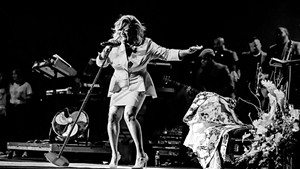While most people dream in pictures and words, one night a few months ago James Harvey heard music in his sleep.
A trombone virtuoso who is no slouch on the piano, Harvey replayed the notes several times in his mind before it dawned on him that this surprising nocturnal inspiration seemed perfect for his new jazz composition, Monkey.
“I had tried different things that didn’t seem to fit. This was simple but a little on the mysterious side,” he recalls, his craggy face breaking into an impish smile of delight.
Some moonlighting muse must have known Harvey was then trying to figure out how to complete the middle section of a 45-minute piece commissioned by the Flynn Center for the Performing Arts last fall. He’ll be at the piano when his trio premieres Monkey this weekend at the FlynnSpace in Burlington.
“James is one of Vermont’s leading jazz artists who composes,” observes Flynn artistic director Arnie Malina. “And he’s been involved nationally with many of the great figures in his field. He’s also got a really wonderful trio. It should make for a very exciting evening.”
If Monkey shines, it could underscore the ever-modest Harvey’s inclination to move his career in the direction of more concert settings. He sometimes tires of the distracting club milieu, “worrying about some drunk coming over and yelling at me while I play.”
The title of his FlynnSpace debut is meant to convey the music’s “playful quality, non-verbal and mischievous,” he explains. “And I was born in 1957, what the Chinese call the Year of the Monkey. To Tibetans, it’s the Year of the Fire Monkey.”
Harvey’s personal trial-by-fire-monkey includes a 12-year struggle with heroin addiction, of which he cured himself in 1996. “When I got clean, I couldn’t play. I’d been high for so long that my brain was rewired. My fingers wouldn’t go where I wanted them to on the piano.”
Despite that setback, other doors started opening when he kicked his drug habit. A significant part of Harvey’s redemption can be attributed to Buddhism, which had long intrigued him but only became a daily practice five years ago. Sitting in a lotus-like position on floor pillows at a Burlington meditation center, he traces the way art and spiritual yearnings have intersected in his life.
“I officially became a Buddhist in May 1997,” Harvey recalls. “For the first few years, I didn’t have much time for music. It was still my livelihood but I wasn’t composing. It wasn’t important to me. I had a lot of lost time to make up for.”
He has been able to restore his talent through study and meditation. “There is a gradual process of relaxing. I’m a little high-strung. People who are not high-strung don’t tend to fill themselves with heavy narcotics.”
Now, Harvey is extending himself beyond local club gigs thanks to Monkey and the release of an album, Grateful, in May. “I didn’t care much one way or the other about doing a record, but someone offered me the money to do it. I needed cash for a Dharma program,” he says, referring to a month-long retreat to contemplate the teachings of Buddha.
His embrace of an Eastern faith appears to be a safe haven for the 44-year old Harvey, who was raised on a Duxbury farm as one of eight Irish Catholic children. He played in his high school band and with the Vermont Youth Orchestra. Harvey’s first true encounter with jazz came at age 13 or 14, when he stumbled upon work by Miles Davis and John Coltrane on a sampler album in a library. “I thought, ‘Whoa! What’s that?’”
To continue his classical education, he began attending Boston’s New England Conservatory in 1973, but switched majors after three days. “I was interested in playing only living American music. The African-American tradition is one of the greatest examples of mastery on the planet, a complete art form that’s intellectual and sophisticated but just tears your heart.”
During that period, Boston was being torn apart by racial tension. Harvey sat in with groups doing “James Brown, the O’Jays, all the popular stuff” at clubs in black communities. “I really didn’t like white people at that point,” he says.
Harvey escaped Beantown by enrolling at the Creative Music Studio in Woodstock, New York. There, he was immersed in the avant-garde world, rubbing shoulders with the likes of Cecil Taylor and Jack deJohnette. He also was introduced to Buddhism. When Harvey read a book by Trungpa Rinpoche, “it scared me. I was just floored. It was so completely honest. It was a path described as ‘a train you can’t get off.’”
After a year, he dropped out of school and found work as a trombone player for hire, which took him as far away as Europe on tours. “I lived a nomadic life for five years,” Harvey says. “Along the way, I met a brilliant guy, Peter Apfelbaum, who played tenor sax, piano and drums. He was into African rhythms and traditional harmonies. We worked together off and on for the next 14 years.”
During one of those off times in the early 1980s, Harvey returned to Vermont and launched The H-Mob. The band, which attracted a legion of devotees, allowed him to strut his stuff on trombone, guitar, keyboards and drums. Along with sax player Dave Grippo, he also tackled the sounds of Ornette Coleman, Charlie Mingus and Thelonious Monk, among others, as a member of The Crash and Burn Bop Cult.
Despite all this activity in his home state, Harvey decided to rejoin Apfelbaum and The Hieroglyphics Ensemble, then based in San Francisco. It was a heady time. The band issued two albums. Harvey, who had also married by then, was recruited to play on Multikulti, a recording by the legendary Don Cherry.
Financial success still eluded him, but the insidious downside for Harvey was heroin and its equally addictive cure, methadone. With his marriage breaking up, he came back to Burlington in 1995. In an attempt to rid himself of the evil monkey on his back, Harvey signed up for an experimental University of Vermont clinic that dispensed buprenorphine.
“It didn’t work,” he reports. “I spent a year feeling miserable. I’d go for two weeks without sleeping for one second, besides being sick. I’d always cave in. Eventually, in my brilliant little mind, I realized: ‘The problem with this is that you’re conscious.’ So, I remained flat on my face, drunk, for a week. I’d just drink till I passed out. At the end of the week, I was a mess but I was off heroin. Then, of course, I had to stop drinking.”
Harvey cautions that substituting alcohol for heroin “is totally not a good thing. People really can’t do something like that on their own. If I didn’t have people around to help me, I would absolutely not have been able to do it.”
Finally clean and sober, he was free to undertake a healthier approach to life. Buddhism, which had frightened him at age 18, now beckoned. “I was 38 or 39, so I asked myself, ‘If not now, when?’”
His trio — Gabe Jarrett on drums and John Rivers on bass — has been together for three years. With them, Harvey has put aside his horn for the moment. “It’s easier to run a band and communicate the totality of a piece on the piano. Plus, I never found [a pianist] who played my stuff the way I want it to be played.”
In Monkey, Harvey’s dream-derived sequence meshes with four other sections, some melodic and others quite abstract. He likens its symphonic “arch” structure to that of Bartok’s Fourth String Quartet, a sign that the jazz aficionado has come to respect the artistry of dead, white Europeans once again.
He is open to presenting Monkey at other cultural venues or even seeking more commissions to develop new work, although it would mean overcoming his long-term “reluctance to pin down what I’m going to do before I do it.”
When not exploring uncharted horizons with his trio, Harvey still plays a regular gig with GFB — the Grippo Funk Band — at Red Square in downtown Burlington. He rules out going back on the road, however, largely because it would likely upset the equilibrium he has finally attained.
“With both Buddhism and jazz, you have to relax so they can accomplish something beyond yourself,” Harvey says, stretching his legs after almost an hour in the lotus position. “Improvisation in music is something that appears from nowhere and disappears. A lot of strange stuff happens. It’s important not to try to hold on. You cannot recapture a wonderful experience. You can only get in touch with the energy and ride it.”
Sounds somewhat simian, not a bad thing for the James Harvey of 2001. “I’m different,” he suggests “— a brand new guy.”












Comments
Comments are closed.
From 2014-2020, Seven Days allowed readers to comment on all stories posted on our website. While we've appreciated the suggestions and insights, right now Seven Days is prioritizing our core mission — producing high-quality, responsible local journalism — over moderating online debates between readers.
To criticize, correct or praise our reporting, please send us a letter to the editor or send us a tip. We’ll check it out and report the results.
Online comments may return when we have better tech tools for managing them. Thanks for reading.